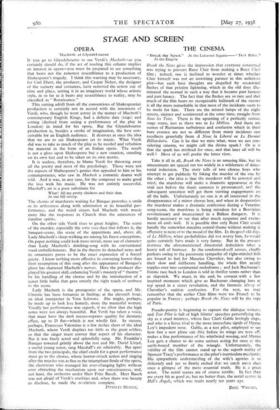STAGE AND SCREEN
OPERA
Macbeth at Glyndetourne
IF you go to Glyndebourne to see Verdi's Macbeth—as you certainly should do, if the act of reading this column implies an interest in opera—you must be prepared to see something that bears not the remotest resemblance to a production of
Shakespeare's tragedy. I think this warning may be necessary, for Carl Ebert, the producer, and Caspar Neher, the designer of the scenery and costumes, have removed the action out of time and place, setting it in an imaginary world whose artistic style, in so far as it bears any resemblance to reality, may be classified as "Renaissance."
This cutting adrift from all the conventions of Shakespearian production is certainly not in accord with the intentions of Verdi, who, though he went astray in the matter of Macbeth's contemporary English Kings, had a definite date (1040) and setting (derived from seeing a performance of the play in London) in mind for his opera. But the Glyndebourne production is, besides a stroke of imagination, the best con- ceivable for an English audience. It destroys at once the idea that we are to see Shakespeare set to music. What Verdi did was to take as much of the play as he needed and refashion the material in the form of an Italian opera. The result is not a gloss upon Shakespeare but a new creation, standing on its own feet and to be taken on its own merits.
It is useless, therefore, to blame Verdi for throwing away all the poetry and most of the psychology. Those were not the aspects of Shakespeare's genius that appealed to him or his contemporaries, who saw in Macbeth a romantic drama well told. And it was, in any case, for the composer to make good the loss with his music. He was not entirely successful. Macduff's air is a poor substitute for
What! All my pretty chickens and their dam At one fell swoop.
The chorus of murderers waiting for Banquo provokes a smile at its artlessness along with admiration at its beautiful per- formance, and the weird sisters hail Macbeth with music more like the responses in Church than the utterances of familiar spirits.
On the other side Verdi rises to great heights. The scene of the murder, especially the sotto voce duet that follows it, the banquet-scene, the scene of the apparitions and, above all, Lady Macbeth's sleep-walking are among his finest conceptions. On paper nothing could look more trivial, more out of character than Lady Macbeth's drinking-song with its conventional vocal embellishments. But in the theatre its detached notes and its ornaments prove to be the exact expression of a forced gaiety. I know nothing more effective in conveying horror than their resumption of this song after the appearance of Banquo's ghost has shattered Macbeth's nerves. Here the producer dis- played his greatest skill, enhancing Verdi's mastery of" theatre" by his handling of the chorus and by the introduction of a queer little ballet that gave exactly the right touch of eeriness to the scene.
Lady Macbeth is the protagonist of the opera, and Mr. Christie has been fortunate in finding, at the eleventh hour, an ideal interpreter in Vera Schwarz. She might, perhaps, be made up to look less homely, more the masterful woman. Vocally her performance was superb, if we allow that the high notes were not always beautiful. But Verdi has taken a voice, that must have the dark mezzo-soprano quality for dramatic effect, up to D flat—which is not wholly fair. In stature, perhaps, Francesco Valentino is a few inches short of the ideal Macbeth, whom Verdi displays too little as the great soldier, so that the singer must convey that aspect of his character. But it was finely acted and splendidly sung. Mr. Franklin's Banquo towered grimly above the rest and Mr. David Lloyd, a useful young tenor, sang Macduff's air admirably. But apart from the two principals, the chief credit for a great performance must go to the chorus, whose horror-struck action and singing after the murder was as fine as the triumphant finale of the opera, the electrician who managed his ever-changing lights without ever obtruding the mechanism upon our consciousness, and, not least, the orchestra under Herr Fritz Busch. Herr Busch was not afraid of Verdi's crudities and, when there was beauty to disclose, he made the re 'elation complete.
DYNELEY HUSSEY.


















































 Previous page
Previous page